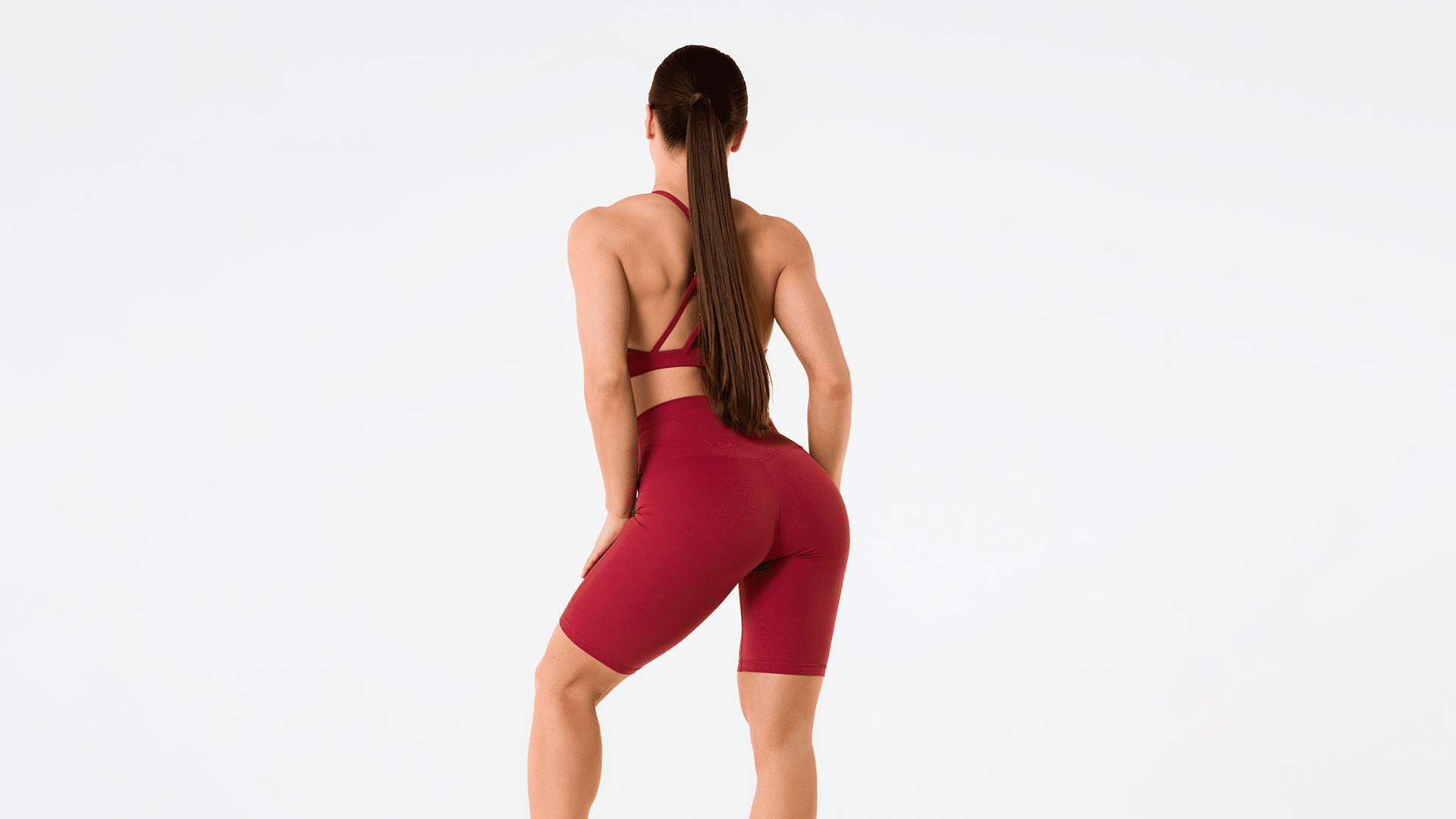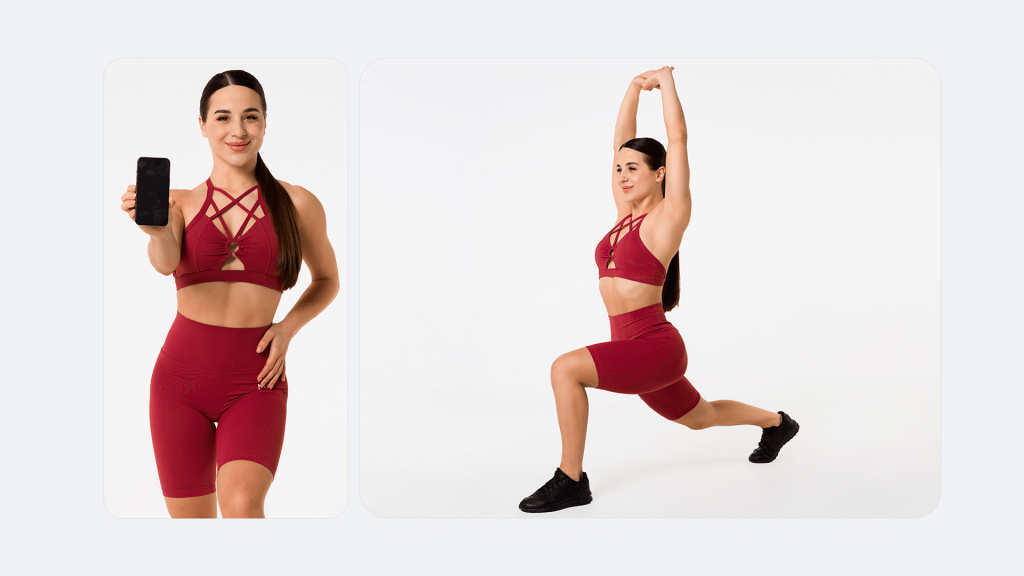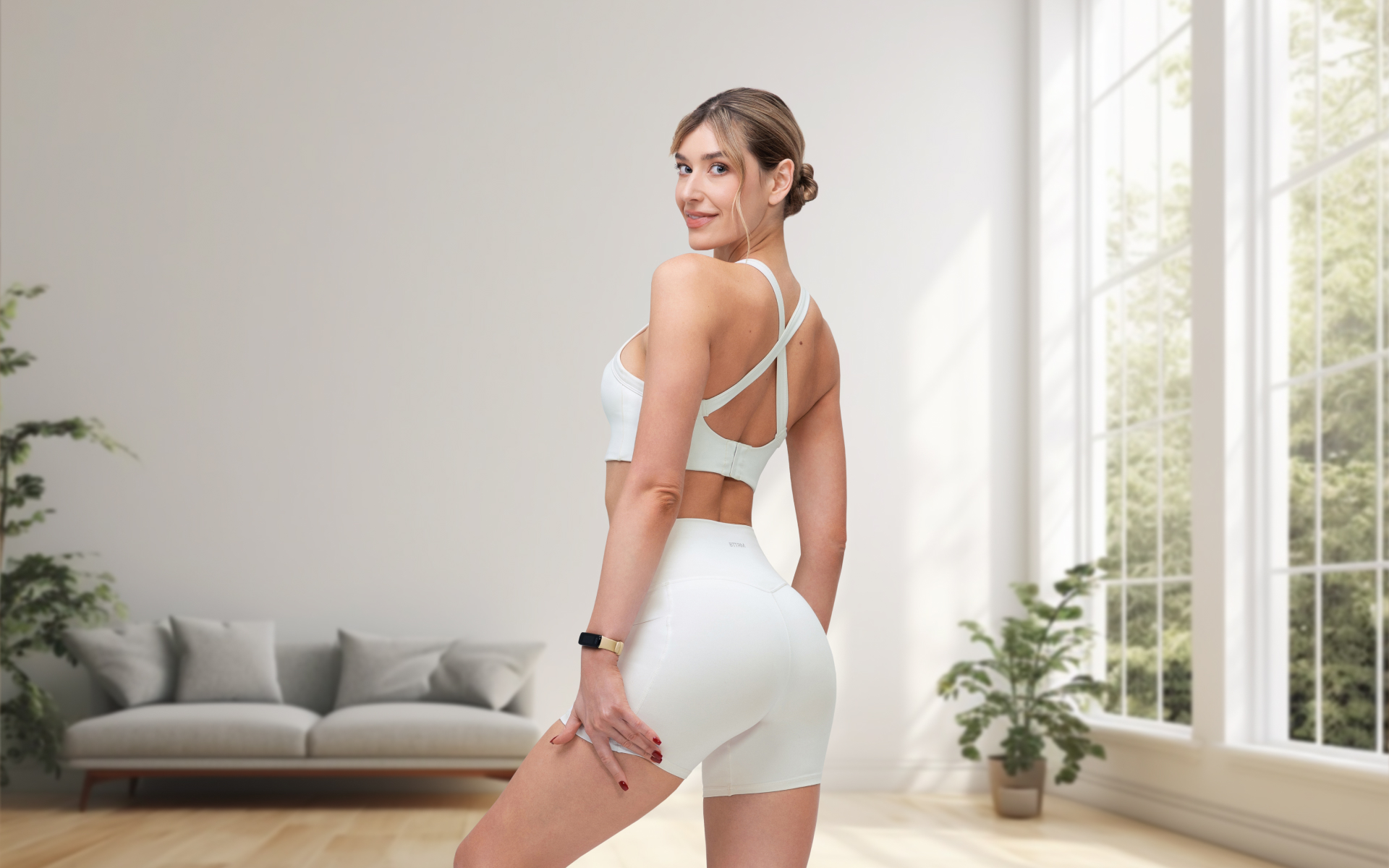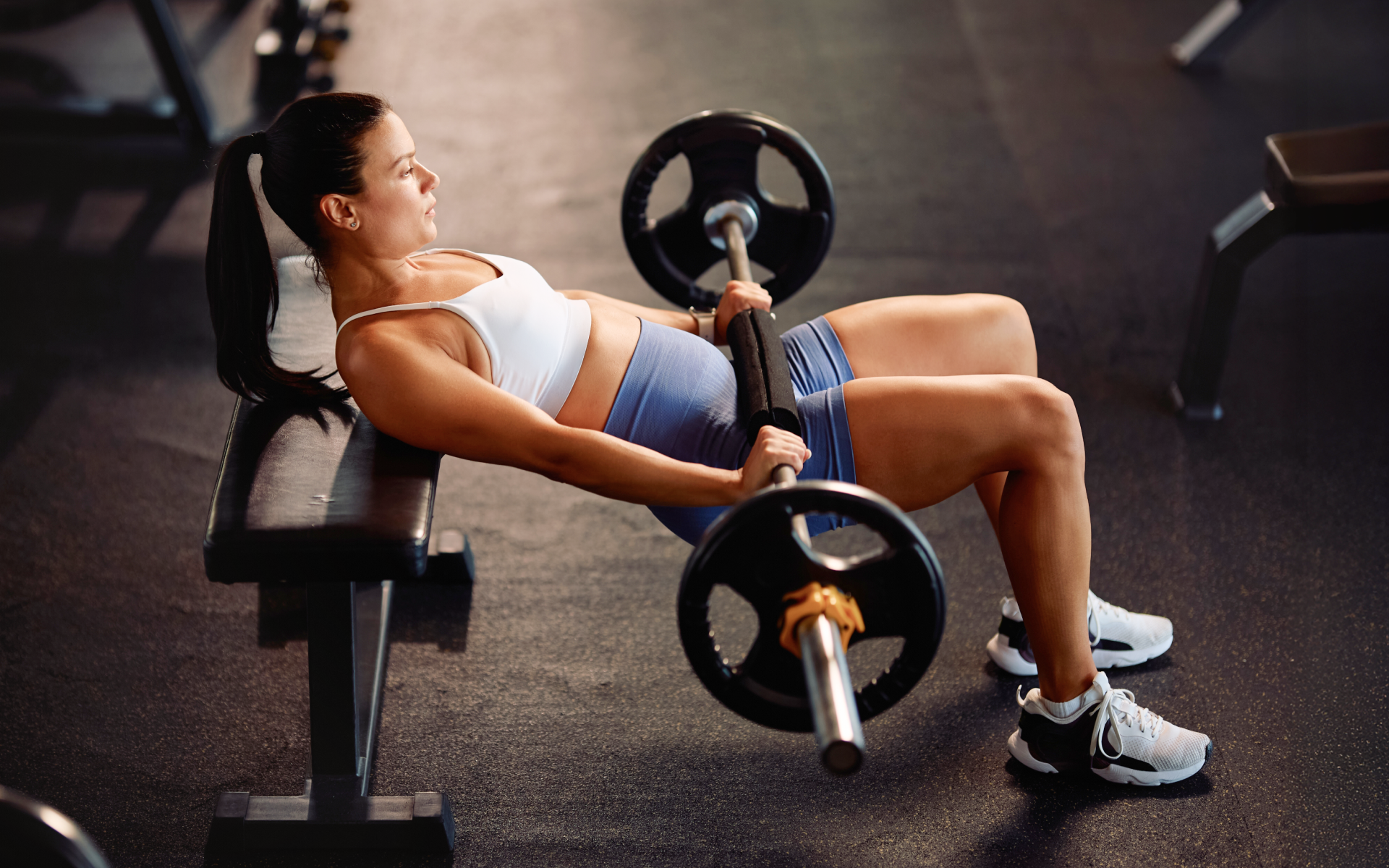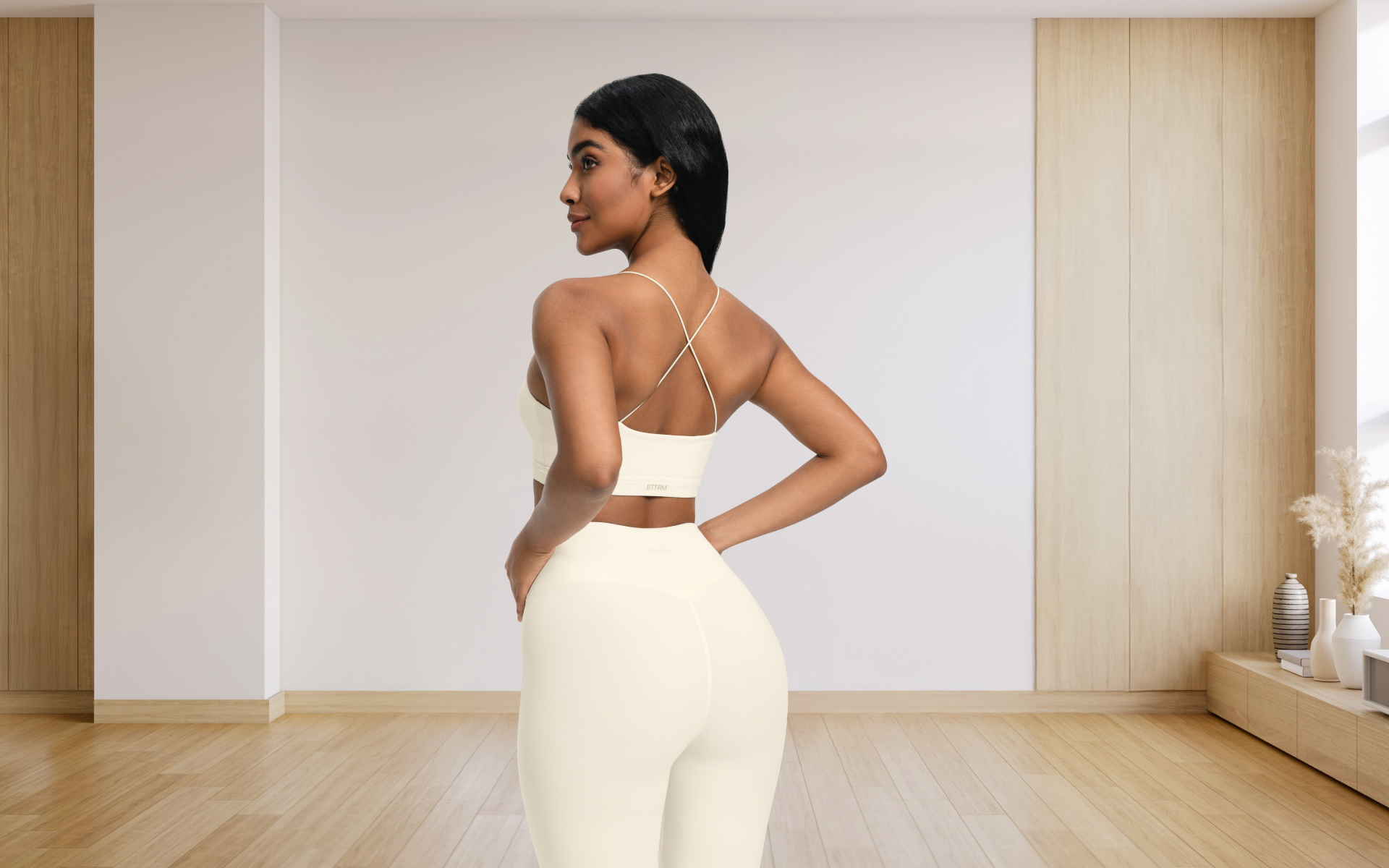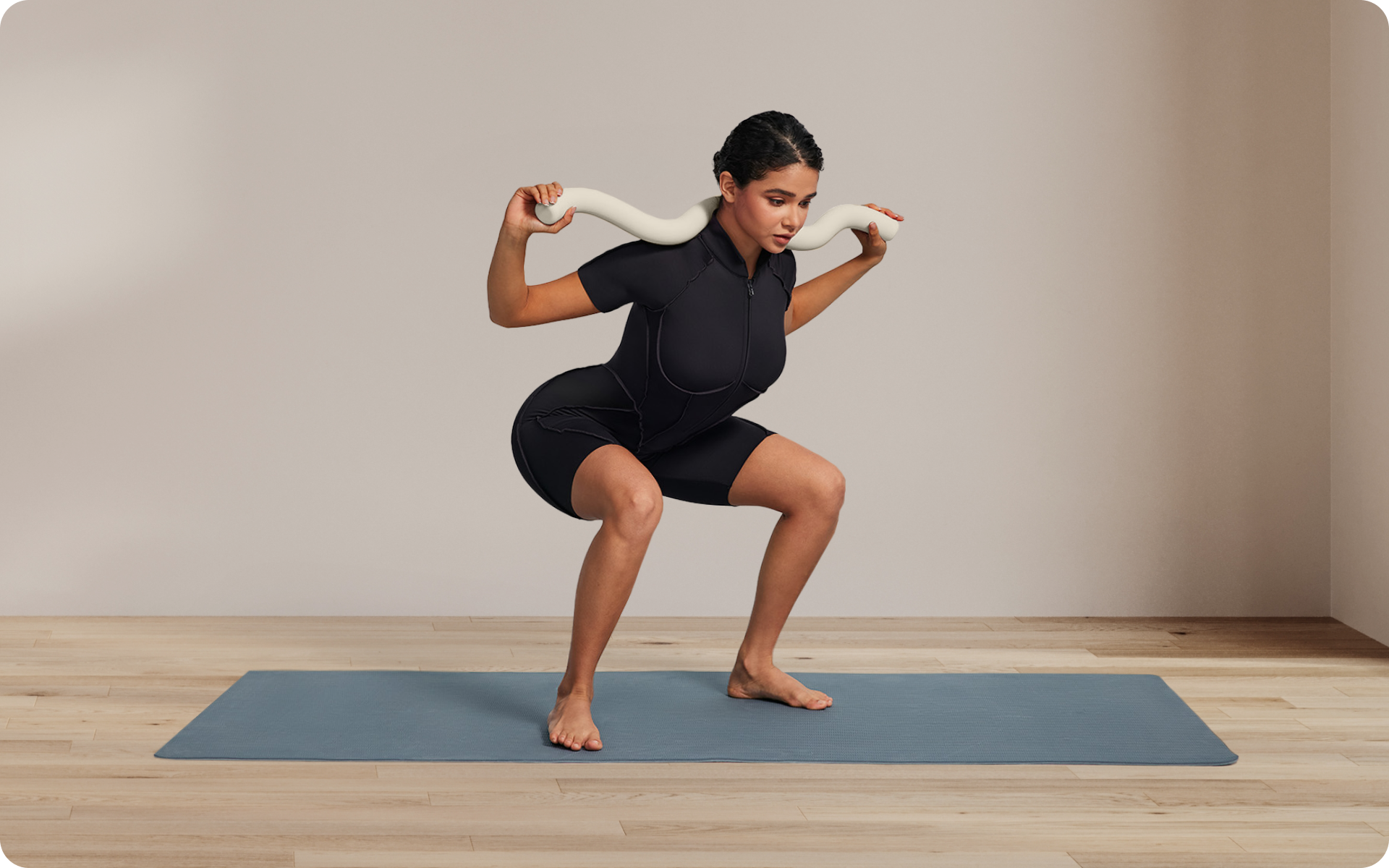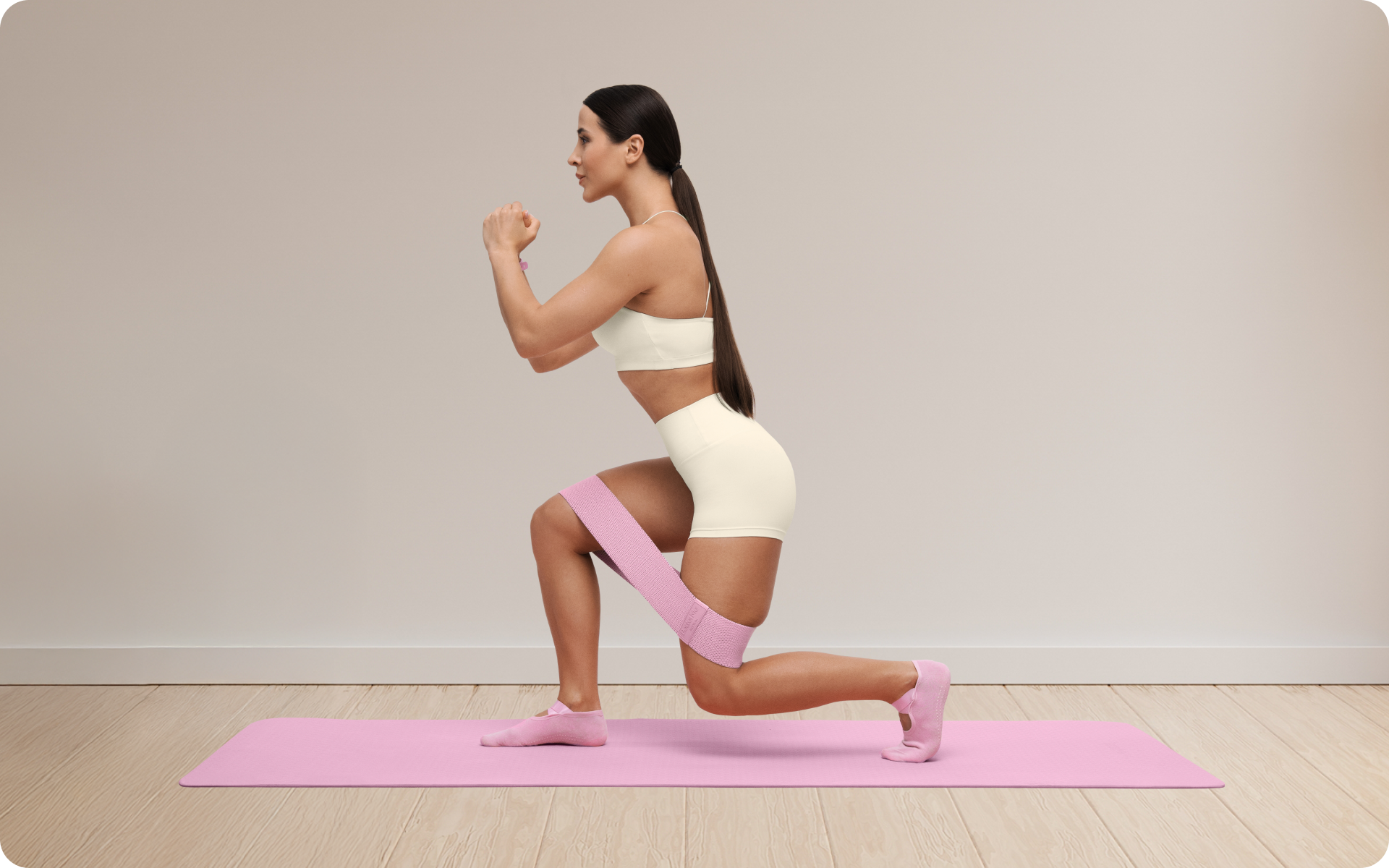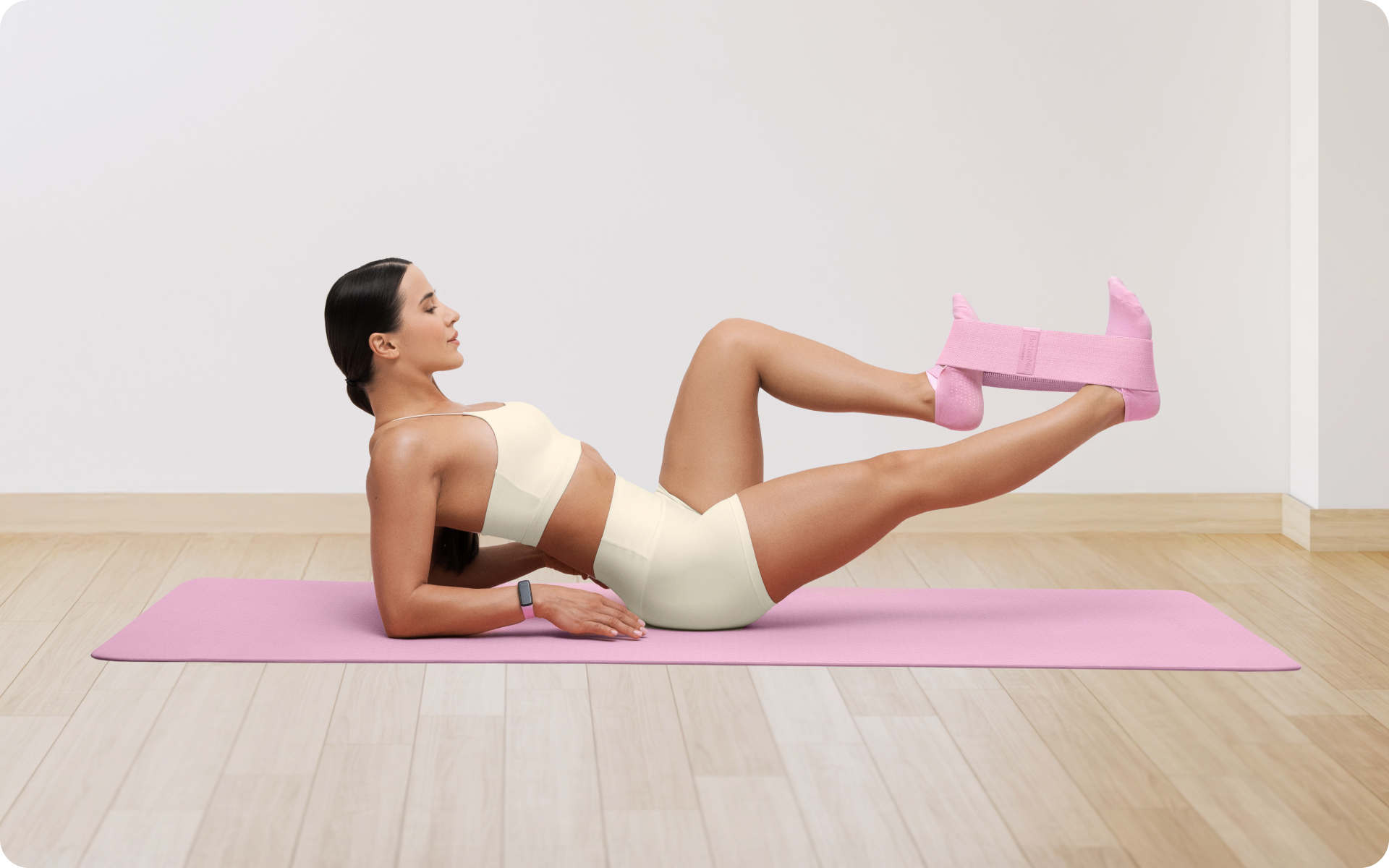A round, peachy booty is a fitness goal that many aspire to achieve. You’ve probably found yourself scrolling through social media, admiring those enviable bubble butts and wondering how you too can get one.
The glutes are a highly trainable muscle group and with the right exercises, you can definitely make progress.
Also, by strengthening your glutes, you’ll have more power for various sports and daily activities.
So, what exercises should you incorporate into your routine? How often should you train to start seeing results? What should you do if you hit a plateau?
Find answers to all these questions and more in our comprehensive bubble butt workout guide.
How To Increase Bum Size in 1 Week?
Just to be clear, you can’t drastically grow your booty in just one week.
We know that’s not what you want to hear.
But achieving your ideal bubble butt takes time and consistency – two things that are essential for making progress in any fitness goal.
Here’s why. Your booty is made up of three main muscles – the gluteus maximus, gluteus medius and gluteus minimus. To see real growth in your bum size, you need to train all three of these muscles regularly.
While it’s possible to make some gains in a week by targeting specific exercises and increasing the intensity, these will mostly be temporary changes due to muscle pump and inflammation.
In order to see long-lasting results, you need to follow a consistent workout routine over a prolonged period of time. Following a well-structured, progressive program will ensure you are consistently stressing and challenging the muscle fibers in your glutes enough every time you train.
As they repair and become stronger, your booty will also start to look more sculpted and defined.
With a consistent booty workout routine, adequate rest, and an optimal diet that is rich in protein and carbohydrates for gains, you’ll start seeing gradual changes in your booty. At about 2-3 months in, you’ll also start to feel stronger and more powerful in your lower body.
As you start your glute-focused routine, don’t be discouraged if you don’t see results immediately. Results take time, but they’re ultimately worth it.
Lean and toned up body isn’t just a far-fetched fantasy. Check out the BetterMe app and watch it propel your weight loss journey into high gear!
What Are the Most Effective Exercises for Bubble Butt?
The most effective exercises for bubble butt are those that target all three gluteal muscles, as well as the surrounding muscles in your legs and core.
The best bubble butt workout plan can include several glute-focused exercises, such as:
Front/Back Barbell Squat (Gluteus Maximus)
The front and back barbell squat is a compound exercise that targets the gluteus maximus, which is the largest muscle in the buttocks region. This exercise works by requiring you to hinge at the hips and bend at the knees, lowering your body and engaging your glutes.
Steps:
- Start by standing with your feet shoulder-width apart with a barbell resting on your upper back for the back squat or on your shoulders in front of your body for the front squat.
- Keep your chest up, pull your shoulders back, and look straight ahead.
- Start the move by bending your knees and pushing your hips back as if you’re sitting down onto a chair.
- Lower yourself until your thighs are parallel to the floor.
- Push through your entire foot to stand back up, squeezing your glutes at the top of the movement.
- Make sure to keep your core engaged throughout the exercise in order to maintain balance and stability.
- Repeat for 3 sets of 10-15 reps.
Glute Bridge (Gluteus Maximus, Gluteus Medius)
The glute bridge engages both the gluteus maximus and medius by having you lift your hips off the ground, which creates tension in these muscles.
Steps:
- Lie down on your back with your knees bent, feet flat on the floor, and arms by your sides.
- Push through your heels and lift your hips off the ground while you squeeze your glutes.
- Keep your body in a straight line from your shoulders to your knees.
- Hold this position for a few seconds, then slowly lower your hips back to the starting position.
- Aim for 3 sets of 15-20 reps.
Lunges (Gluteus Maximus, Gluteus Medius)
Lunges are a great way of targeting both the gluteus maximus and medius. During a lunge, you perform a hip extension, which primarily engages these muscles.
Steps:
- Stand up straight with your feet hip-width apart.
- Take a step forward or backward with one foot and lower your body until your front knee is bent at 90 degrees.
- Keep your back straight and ensure your front knee is aligned above your ankle.
- Push back up to the starting position, driving through the heel of your front foot.
- Repeat for the other side.
- Aim for 3 sets of 10-15 reps on each leg.
Step-Ups (Gluteus Maximus, Gluteus Medius)
Step-ups target the gluteus maximus and medius by requiring you to step onto an elevated platform, which engages these muscles as you push off the ground.
Steps:
- Stand in front of a box or step with your feet hip-width apart.
- Step onto the box with one foot, pushing through your whole foot.
- Bring your other foot up to meet the first one.
- Step back down and repeat.
- Aim for 3 sets of 10-15 reps on each leg.
Hip Thrusts (Gluteus Maximus, Gluteus Medius, Gluteus Minimus)
Hip thrusts are a powerful exercise that targets all three gluteal muscles. You perform a hip extension against resistance, which requires a great deal of effort from your glutes.
Steps:
- Sit on the ground with a bench behind you and a weighted barbell over your hips.
- Lean back against the bench so your shoulder blades are near the top of it.
- Start the movement by pushing through your feet and extending your hips vertically through the barbell.
- Your weight should be supported by your shoulder blades on the bench and your feet on the ground.
- Extend as far as possible without arching through your back or compromising your form, then reverse the motion to return to the starting position.
- Aim for 3 sets of 8-10 reps.
Bulgarian Split Squat (Gluteus Maximus, Gluteus Medius)
The Bulgarian split squat is a single-leg exercise that targets the gluteus maximus and medius. This movement requires balance, stability, and strength.
Steps:
- Stand facing away from a bench, holding a pair of dumbbells at arm’s length by your sides.
- Place the toes of your left foot on the bench behind you.
- Lower your body until your right thigh is parallel to the floor.
- Pause, then push back up to the starting position as quickly as possible.
- Do all your reps on one leg, then switch legs and repeat.
- Aim for 3 sets of 10-15 reps on each leg.
Read more: 5 At Home Workouts for Moms, With and Without Weights
Deadlifts (Gluteus Maximus)
Deadlifts are a powerful compound exercise that targets the gluteus maximus. The lifting and lowering phase of the deadlift requires a great deal of work from this muscle.
Steps:
- Stand with your feet hip-width apart, knees slightly bent, and a barbell in front of your shins.
- Bend at your hips and knees, grabbing the barbell with an overhand grip.
- Engage your lats to prevent injury to your lower back and drive through the ground with your feet to stand up with the barbell.
- Lower the bar to the floor, keeping it as close to your body as possible.
- Aim for 3 sets of 10-12 reps.
Donkey Kicks (Gluteus Maximus)
Donkey kicks target the gluteus maximus by requiring you to kick one leg back at a time, engaging this muscle each time you lift your leg.
Steps:
- Start on your hands and knees on the floor.
- Keeping your right knee bent 90 degrees, flex your foot and lift your knee to hip level.
- Lower your knee without touching the floor and repeat the lift.
- After you’ve done all your reps with your right leg, switch legs and do the same number with your left leg.
- Aim for 3 sets of 15-20 reps on each leg.
Fire Hydrants (Gluteus Medius)
Fire hydrants target the gluteus medius, a smaller muscle in your buttocks that’s responsible for hip abduction and rotation.
Steps:
- Start on all fours, knees directly under your hips, and hands directly below your shoulders.
- Keeping your knee bent, raise your right leg out to the side until your thigh is parallel to the floor.
- Keep your pelvis stable and avoid tilting to the side.
- Lower your leg back down.
- Repeat on the other side.
- Aim for 3 sets of 15-20 reps on each leg.
Single-Leg Squat (Gluteus Maximus, Gluteus Medius)
The single-leg squat targets both the gluteus maximus and medius. It requires a high level of balance, flexibility, and strength.
Steps:
- Stand on one leg, with your other leg extended straight in front of you.
- Lower your body as far as possible by pushing your hips back and bending your knees.
- Pause, then slowly push yourself back to the starting position.
- Keep your torso as upright as possible throughout the movement.
- Do all the reps on one leg, then switch legs and repeat.
- Aim for 3 sets of 10-15 reps on each leg.
Sample Bubble Butt Workout Plan for Beginners
Here’s a sample workout plan combining some of the above exercises to help beginners work toward a toned and lifted bubble butt:
Day 1 – Glute Focus
- Squats: 3 sets of 12 reps
- Lunges: 3 sets of 12 reps on each leg
- Step-Ups: 3 sets of 12 reps on each leg
- Hip Thrusts: 3 sets of 12 reps
- Donkey Kicks: 4 sets of 15 reps on each leg
- Fire Hydrants: 4 sets of 15 reps on each leg
- Single-Leg Squat: 3 sets of 12 reps on each leg
Day 2 – Glute Focus
- Bulgarian Split Squat: 3 sets of 12 reps on each leg
- Deadlifts: 3 sets of 12 reps
- Hip Thrusts: 3 sets of 12 reps
- Fire Hydrants: 4 sets of 15 reps on each leg
- Donkey Kicks: 4 sets of 15 reps on each leg
- Single-Leg Squat: 3 sets of 12 reps on each leg
- Step-Ups: 3 sets of 12 reps on each leg
Day 3 – Flexibility and Mobility
- Foam Rolling: Spend 10-15 minutes foam rolling your glutes, legs, and hips to release tension and help improve mobility.
- Stretching: Perform a variety of stretches for your lower body, focusing on the glutes, hamstrings, and hip flexors. Use the following stretching routine for guidance:
- Glute Stretch: 30 seconds on each side
- Hamstring Stretch: 30 seconds on each side
- Hip Flexor Stretch: 30 seconds on each side
- Pigeon Pose: 1 minute on each side
- Mobility sequence: Perform a series of dynamic movements to increase blood flow and improve range of motion in the hips and glutes. Here’s an example routine:
- Hip Circles: 15 reps on each side
- Lateral Leg Swings: 15 reps on each side
- Glute Bridges: 10 reps
- Squat to Stand: 10 reps
Note: Start with lower reps and sets if you’re new to these exercises and gradually increase as you become more comfortable and increase in strength.
Don’t neglect your other muscle groups, as the glutes won’t work in isolation. The above routine can be combined with a full-body workout plan or other targeted muscle groups for an effective fitness routine
You’ll find more exercise ideas in our blog post: Glute Isolation Exercises.
Looking for a way to break the vicious cycle of weight loss and tone up all the jiggly parts? Watch the extra pounds fly off and your muscles firm up with the BetterMe app!
How Can I Work Out to Get a Bubble Butt?
Choosing the right exercises for your glutes is important, but so is the way you perform them. Here are some tips on how you can maximize your workout for a bubble butt:
Use proper form: Make sure you perform each exercise with correct form and technique. This will ensure your glute muscles are targeted effectively while also minimizing the risk of injury.
Increase intensity gradually: As your glute muscles become stronger, gradually increase the weight/resistance or the total reps you perform. This will help challenge your muscles and promote growth.
Vary your workout: Don’t just stick to one type of exercise for your glutes. After a while following the same bubble butt workout routine, your muscles may adapt and plateau. Mix things up by incorporating different exercises and variations.
Focus on mind-muscle connection: When you perform glute exercises, make sure you focus on engaging your glute muscles rather than just going through the motions. This can help activate and target the correct muscles (2).
Stay consistent: You must stick to your bubble butt workout routine for a while (even after you start seeing results) in order to maintain and continue building your glute muscles.
How Can I Get a Bigger Butt Naturally?
To get a bigger butt naturally, you must structure your diet and exercise routine for optimal muscle growth and fat loss. Here are some tips on how you can get a bigger butt naturally:
Consume enough protein: Protein is essential for muscle growth, so make sure you’re consuming enough of it in your diet (2). Good sources of protein include lean meats, fish, eggs, dairy products, legumes, and tofu.
Eat healthy fats: Healthy fats help with hormone production, which is important for muscle growth (3). You should include sources of healthy fats such as avocados, nuts, seeds, and olive oil in your meals.
Consider your energy needs: A diet that is structured for fat loss and muscle gain should be based on your individual energy needs. Use an online calculator to estimate your daily calorie and macronutrient needs (1).
Do compound exercises: Compound exercises work multiple muscle groups simultaneously, which makes them more effective for building a bigger butt. Some examples include squats, deadlifts, lunges, and hip thrusts.
Our blog post: How to Get Rid of Cellulite on Butt discusses these in more detail and is a great resource to help you achieve your goals.
Read more: Workout Motivation for Females: Here’s How to Boost Your Mojo
FAQs
How can I get thick fast with an intense bubble butt workout?
To get thick fast with an intense bubble butt workout, you need to focus on exercises that target your glutes such as squats, lunges, hip thrusts, and deadlifts. Increase the intensity by adding weights or resistance bands to these exercises. Combining these exercises with an adequate diet that is rich in protein, carbohydrates, and essential nutrients will also support optimal muscle growth.
How many months should I work out my butt to make it bubble?
How many months it will take to develop a bubble is determined by several factors such as genetics, diet, and consistency of your workout. That being said, noticeable changes can be seen in as little as one to three months with consistent, targeted exercises. Remember, sustainable progress is more important than rapid, short-term gains.
How can I work out my hips and lower back to get a round bubble butt?
To develop a round bubble butt, you need to incorporate exercises that target your hips and lower back in addition to your glutes. Hip abductions, bridges, and lower back extensions are all great for this. They will strengthen your hip and lower back muscles, which are essential for enhancing the roundness of your bubble butt.
The Bottom Line
A well-designed bubble butt workout can help you achieve a fuller, rounder butt. Remember to include exercises that target all three gluteal muscles – the gluteus maximus, medius, and minimus. In addition, maintaining a healthy diet and staying consistent with your workouts are both factors that are essential for achieving your desired results.
DISCLAIMER:
This article is intended for general informational purposes only and does not serve to address individual circumstances. It is not a substitute for professional advice or help and should not be relied on for making any kind of decision-making. Any action taken as a direct or indirect result of the information in this article is entirely at your own risk and is your sole responsibility.
BetterMe, its content staff, and its medical advisors accept no responsibility for inaccuracies, errors, misstatements, inconsistencies, or omissions and specifically disclaim any liability, loss or risk, personal, professional or otherwise, which may be incurred as a consequence, directly or indirectly, of the use and/or application of any content.
You should always seek the advice of your physician or other qualified health provider with any questions you may have regarding a medical condition or your specific situation. Never disregard professional medical advice or delay seeking it because of BetterMe content. If you suspect or think you may have a medical emergency, call your doctor.
SOURCES:
- Body Weight Planner (n,d,nih.gov)
- Importance of mind-muscle connection during progressive resistance training (2016,nih.gov)
- Recent Perspectives Regarding the Role of Dietary Protein for the Promotion of Muscle Hypertrophy with Resistance Exercise Training (2018,nih.gov)
- The Friendly Side of Fat (n,d,utah.edu)
